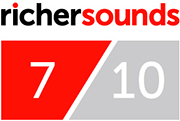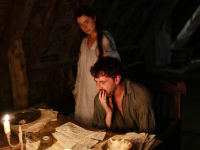
It’s been a decade now since Los Campesinos!’ first release since their days together at Cardiff Uni, but have the past 6 years mellowed the tongue-in-cheek, energetic and sometimes bratty worldview of this seven-piece set?
Blasting into the rock world back in 2006 from one of the traditional rock proving grounds, South Wales, this indie-rock septet (members including violins and glockenspiels as well as guitars and drums) was signed to Wichita records less than a year after formation and had their first release in 2007. Not content to stop there the band was whisked off on tour immediately, including a whistle-stop tour to Seattle to record more material.
Meaning ‘The Peasants’ Los Campesinos have spun the line-up merry-go-round a few times, unsurprising in a band of their size, and their sound appeared to be calming as time and band changes seemed to age them. This album however, Sick Scenes, can easily be seen as a return to form and figure of their earliest work.
The starting point of the album may feel like the indie rock you’d be expecting here with Renato Dell’arra (2008) feeling very retrospective with an almost Fratelli-like vocal range and traditional ooo and aah supporting melodies. The following few songs however, lead us straight away from the usual frenetic buzz of these poppier traditions and down a more melancholy, sometimes angry and less juvenile path.

Sick Scenes is the sixth studio album by Welsh rock band Los Campesinos!
Sad Suppers is the leading set of this different approach with a melody of minimalist picked guitar and understated drums allow us to focus on the vocals and lyrics, perhaps more than you usually would with this genre. I Broke Up in Amarante follows straight after with a LoFi punk feel as opposed to the more typical indie-rock offering from the band. The lyrics show the band is maturing with their art but still retains their youthful roots, something so many who age whilst adhering to indie seem to fail at. With lyrics such as ‘It seems unfair to try your best but feel the worst’ shouted at the end and sung throughout this could well be your archetypal break-up song, but with what we’d assume to be quite personal references in the song as well, it’s without the usual angsty edge, and no worse off for it.
Slow Death and Fall of Home come after and the pace slows even further, admittedly at this halfway juncture, this reviewer is a bit concerned about the remaining energy of the rest of the album. The songs are still definitely good, shot through with this same melancholic vibe with imagery of homesickness, and full use of their impressive ensemble with brass and strings both playing large parts here. Some of the best lyrics appear in the former of the two songs as well; listen out for ‘You. On a lilo. On an island. In the Pacific. Me. I am face down. In a puddle. On the high street.’.
5 Flucloxacillin however, is a welcome wake-up call. Punchier, rockier, poppier. It clears the mist of malaise from the previous songs. Clapping rhythms and almost rapped, spoken word refrains show a more youthful vigor but still with reference to the aging nature of the band as opposed to an idealised eternal youth, among other imagery, their hangovers are now chronic, no longer fleeting. For Whom the Belly Tolls follows on the heels here, but aside from keeping pace and an amusing name, it has little else to offer.
As Got Stendahl’s appeared, I genuinely checked my shuffle settings to make sure I hadn’t skipped into a totally different artist. Synth tones to lead and a more overstated drum line with piano melody and clearer vocals than you’d usually expect from the band. It’s a complex song melodically, lyrically and structurally and easily a competitor for best song on the album, not short at 5:27 it definitely feels the correct length without dragging on by ignoring your typical song structure with solos, breaks and refrains scattered throughout.
Leading the album to a close are A Litany/Heart Swells, with its melancholy tone from previous songs and Hung Empty, a sudden injection of indie synth-rock, as a footnote to remind us the band still remembers its origins. With lyrics pertaining to Jersey Boys, Chicken Shops and plenty of references to modern life, be it London living or hometown feeling from the Cardiff natives, the album feels personal and mature. The final lyrics of Hung Empty are shouted, with all the vocalists shouting ‘THIS IS HOW WE DIE!’ together. Is it an accurate foretelling as the album concludes in a sudden stop? We certainly hope not.

Author: Steve, Southgate store





